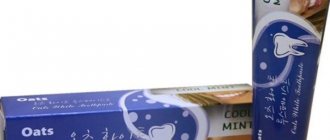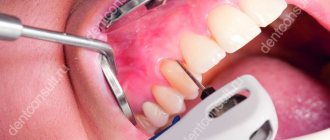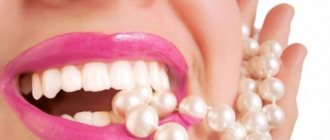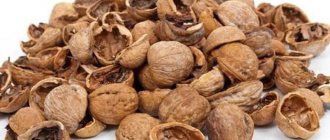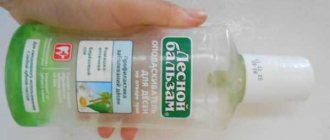Nutrition for periodontal disease should be healthy, varied and nutritious. With proper nutrition, the disease will not worsen, and acute periods will not recur, the gums will be healthy and strong.
Periodontal disease is a systemic disease of the periodontal tissues. The problem provokes bleeding, gradual resorption of bone tissue, the teeth become mobile and fall out over time. In order to prevent complete loss of teeth, it is necessary to modernly treat periodontal disease, and then follow the principles of proper nutrition.
Diet for periodontal disease
The main goal of a diet for periodontal disease is to saturate the body with vitamins and minerals that would help strengthen the gum tissue. The diet should include special foods:
- Solid food
It is solid foods that provide the so-called natural training of gums and teeth. But here you need to stick to the “golden mean”, that is, eat solid foods in moderation: apples, carrots, cucumbers, meat. You should avoid nuts and too hard grains.
But in case of acute periodontal disease, hard foods should be avoided, as they damage soft tissues and cause continuous bleeding of the gums. Include pureed foods and more liquid dishes in your diet.
- Dairy and fermented milk products
“Milk” is enriched with calcium, which is important for the formation of healthy gums and teeth. And fermented milk products activate the gastrointestinal tract, saturate the body with useful substances that are necessary for natural tissue regeneration. Kefir, fermented baked milk, yoghurts, cheese, cottage cheese, sour cream must be included in the daily diet. But you should avoid sugar; you can add a little honey instead.
- Citrus
They contain a large amount of vitamin C. Oranges, lemons, grapefruit, tangerines are welcome. Drink tea with lemon, which also has a tonic effect.
A diet for periodontal disease involves saturating the diet with fruits, vegetables, and dairy products. For protein, seafood, fish, and lean meats are recommended. Everything that is heavy and difficult for the body to digest should be excluded, including alcoholic and low-alcohol drinks.
Drinks recommended for periodontal disease:
- mineral water without gas (minimum 1.5 liters per day);
- weak green tea;
- compote of their fresh fruits or dried fruits;
- yoghurts;
- uzvar;
- jelly.
Causes of gum inflammation
The causes of inflammatory processes in the gums can be very different. Their manifestations in the oral cavity can also be different. These may be ulcers on the cheeks, a red rash on the palate in adults, a taste of pus in the mouth, a bubble or blister on the gum, sores in the mouth, a sore tooth, a hole or a hard growth on the gum. Long-term inflammation of the mucous membranes can degenerate into an abscess on the gums. In this case, the wound in the mouth is most often painful and bleeds.
Any inflammatory process of the mucous membranes of the oral cavity is aggravated by the microflora of the oral cavity. Therefore, treatment of gums and strengthening of teeth is carried out using antiseptics and antibiotics.
Chief physician Salatsky Dmitry Nikolaevich
Sign up for a free consultation
+7
What vitamins should I take if I have periodontal disease?
To combat gum damage, it is necessary to saturate the body with vitamins. Here are the most important groups:
- Vitamin A - helps restore the epithelium, activates regeneration processes. A large amount of vitamin A is found in broccoli, carrots, pumpkin, blueberries, black currants, apricots, spinach, and liver.
- Vitamin E – is directly involved in the metabolic processes of the body. It is found in corn, vegetable oil, and rose hips.
- Vitamin K – takes part in blood clotting processes. Contained in spinach, parsley, cilantro, dill, cauliflower, green tomatoes. It is very important if it is necessary to prevent bleeding gums - a clear and first sign of periodontal disease.
- Vitamin B6 – helps strengthen blood vessels, improves mineral metabolism in the jaw bones. Contained in yeast, grains, legumes.
Along with healthy foods that contain vital vitamins, dentists recommend taking vitamin complexes - a ready-made set of useful components that will help prevent the development of periodontal disease and significantly improve health.
Herbs for rinsing gums
To solve oral problems, there are many simple recipes. We will publish the most effective ones!
Oak bark infusion for fresh breath
This remedy will not only relieve you of bad breath, but will also help cure stomatitis and gumboil. Prepare the infusion in the evening, and in the morning you can start rinsing. Follow the recipe:
- 2 tbsp. l. put the crushed bark in a teapot;
- pour in 0.5 liters of boiling water;
- leave covered all night;
- strain.
You can rinse your mouth after every meal. The effect is noticeable after 2 weeks of using the infusion.
Helpful advice
After tooth extraction and other dental operations, this recipe can be supplemented with chamomile and sage. This rinse will provide not only fresh breath, but also rapid healing of wounds.
Stevia decoction for gum inflammation
A very effective folk remedy against bleeding, gum inflammation and stomatitis is prepared from stevia leaves. Write down the recipe:
- 1 tsp. fill dried leaves with water;
- bring to a boil;
- boil for 5 minutes;
- pour the broth along with the herbs into a thermos;
- leave for 2 hours.
After the broth has cooled a little, you can start rinsing.
Now you know which herbs for teeth and gums will help maintain a radiant smile and oral health. We hope that our tips will be useful to you!
Minerals for periodontal disease
In addition to vitamins, gums and teeth need the following minerals:
- calcium;
- zinc;
- copper;
- iron;
- selenium.
Calcium is a “building element” for teeth and gums. Traditionally, calcium is found in milk, cheeses, yogurt, and sour cream.
Zinc takes part in the regenerative processes of bone tissue. Contained in legumes, beef, lentils, seafood.
Copper is necessary for healthy hematopoiesis, as well as the strengthening of iron in the body. High copper content is found in bread, potatoes, and liver. To ensure copper is absorbed better, it is recommended to include fermented milk products in your diet.
Iron helps enrich the body with oxygen. It is found in buckwheat, liver, beans, and beef.
Selenium is found in foods such as beans, peas, lentils, broccoli, barley, and nuts.
Not recommended products for periodontal disease
- sweets (sweets, chocolate, desserts, cakes, cookies) – it contributes to the destruction of hard and soft tissues of the oral cavity;
If you have periodontal disease, you should not eat viscous sweets (marshmallow, caramel, toffee), which stick to the tooth enamel, and the remains of such food are difficult to clean out with a brush. Such products provoke the formation of plaque and carious lesions.
- flour (buns, cookies, white bread) - these products are better replaced with bread, products made from wholemeal flour;
- fast food, soda, chips, crackers - foods that are poorly digested create problems in the gastrointestinal tract, which definitely affects the condition of the teeth;
- black tea and coffee - they negatively affect the condition of tooth enamel and soft tissues.
Useful herbs for teeth and gums
Every woman dreams of strong, beautiful teeth (okay, let’s be honest, every person!). Smiling at your loved ones, saying kind words to your loved ones - what could be more pleasant? But there are a number of problems that can extinguish even the sweetest smile. These include bad breath, inflammation and bleeding of the gums, painful reaction of the teeth to cold, sour, and sweet foods. And with age, the gums weaken, and the teeth can become completely crooked!
Buy oak (bark) on our website
In order to maintain a charming smile, we recommend that you resort to the help of traditional medicine. Effective recipes have come to us from those times when there were no toothpastes and dentists. They will help you too! Don't know what herbs you can use for teeth and gums? We'll tell you.
From an unpleasant odor
Do you know what causes bad breath? The culprits of unpleasant odor are microorganisms that multiply in the mouth and digestive system. This problem is especially aggravated by caries. Plants that contain tannins and phenols, which suppress the vital activity of organisms, will help cope with the smell. Are you wondering what kind of herbs these are? Here is the list:
- Burdock root disinfects gums, removes putrid odor and yellow plaque from the surface of teeth.
- Oak bark has long been used as an antimicrobial agent. It eliminates unpleasant odor, heals minor gum damage, and reduces toothache. Effective for periodontitis.
- Sage inhibits bacterial growth.
- Nettle treats stomach ailments that may cause bad breath.
For inflammation and bleeding gums
Many people, noticing blood while brushing their teeth, simply do not pay attention to it. But in vain, because this is the first sign of gingivitis and periodontitis. Don't want your teeth to fall out prematurely? Then use herbs for gum inflammation!
Here is a list of the best plants that are used to relieve irritation, reduce bleeding and strengthen gums:
- Aloe has a strong astringent effect, increases blood clotting, and quickly eliminates bleeding. The plant juice is best used diluted due to its acidic reaction.
- Celandine fights gum swelling, traumatic lesions, and is effective against periodontal disease.
- Desiccant reduces bleeding and triggers regeneration of the oral mucosa during stomatitis.
- Strawberries strengthen gums. Berries and infusions of leaves prevent periodontal disease and scurvy, a sign of which is loose teeth.
- Stevia leaves quickly relieve inflammation in the oral cavity and soothe gums. The plant has a hemostatic and antibacterial effect.
Interesting fact
Stevia is not only an herb for rinsing gums, it can be added to teas instead of sugar. It tastes sweet, but does not cause tooth decay.
For toothache
Toothache occurs due to inflammation of the nerve, but many people experience pain when eating hot or cold foods. But there are also people whose teeth react to sweet and sour foods. Are you having the same problem? This means we need to double our care of tooth enamel! Medicinal plants from the following list will help strengthen it and relieve pain:
- Snakehead has an analgesic effect and strengthens teeth.
- Garlic prevents tooth decay from developing.
- Melissa will help get rid of toothache and is effective for stomatitis.
- Lungwort reduces toothache due to pulpitis, reduces tooth sensitivity to cold, hot, and sour.
- Cinquefoil has a mild analgesic, antibacterial and whitening effect.
- Calamus root dulls toothache, strengthens teeth, and has a positive effect on the enamel structure. The plant is used to prepare rinses. And smokers are recommended to simply chew the root - this allows them to quickly give up the bad habit (which will ultimately have a positive effect on the color of their teeth).
Important
Herbs cannot cure pulpitis and other inflammatory diseases that develop inside the tooth. Folk remedies only temporarily relieve the pain, and to eliminate its cause you will have to consult a dentist. And the sooner the better, because the inflammatory process can spread to the periosteum!
